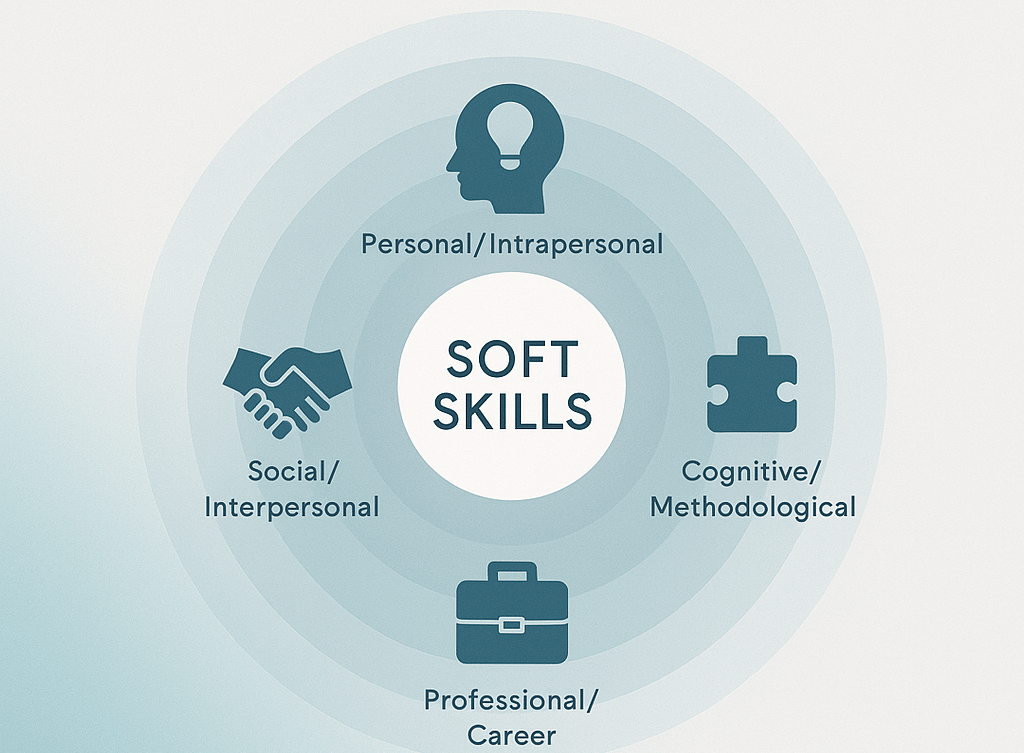Composition of Soft Skills: The Human Side of Success
Soft skills often get mentioned, but rarely defined. Unlike technical hard skills, they’re harder to measure—yet they’re what make the difference between knowledge and real impact. They show up in the way we communicate, adapt, and lead. At their core, soft skills are the human side of success.
Brian McNamara
9/5/20252 min read


Introduction: Why Defining Soft Skills Matters
OECD research calls soft skills transversal, interpersonal, and intangible. That’s a mouthful, but it really means this: they’re the glue that makes technical know-how stick. Without them, expertise falls flat. With them, careers accelerate, organizations thrive, and teams build resilience.
Let’s break down what actually makes up these so-called “soft” skills.
The First Dimension: Personal and Intrapersonal Skills
This is the inward-facing side of growth—the ability to know and manage yourself.
Self-awareness and self-management: understanding emotions, strengths, and weaknesses.¹
Emotional intelligence: recognizing and influencing the feelings of others with empathy.²
Key traits: adaptability, resilience, integrity, and time management.³
Think of the leader who stays calm in a crisis or the teammate who owns mistakes and grows from them. That’s intrapersonal strength at work.
The Second Dimension: Social and Interpersonal Skills
If intrapersonal skills look inward, these look outward. They govern how we connect.
Communication: not just exchanging ideas, but making sure they land.⁴
Teamwork: collaborating and aligning with shared goals.⁵
Relationship building: nurturing trust and positive bonds.⁶
Leadership and negotiation: motivating, delegating, and navigating diverse settings.⁷
When these skills are strong, culture shifts. Teams handle hard projects better than groups of disconnected experts.
The Third Dimension: Cognitive and Methodological Skills
This is the thinking toolkit—the way we approach problems.
Critical and creative thinking: questioning assumptions and generating solutions.⁸
Decision-making: anticipating consequences and acting with clarity.⁹
Strategic processing: connecting dots, synthesizing info, and seeing the bigger picture.¹⁰
Problem-solving: searching for non-standard answers and opportunities.¹¹
These abilities turn raw knowledge into real-world impact.
The Fourth Dimension: Professional and Career Skills
Finally, the workplace layer—the behaviors that help people succeed and move forward.
Professionalism and ethics: reliability, accountability, punctuality.¹²
Adaptability and lifelong learning: keeping pace with change.¹³
Career management: taking initiative, setting goals, and advocating for yourself.¹⁴
Digital literacy: using technology with confidence and fluency.¹⁵
These skills are often the difference between holding a job and building a career.
The Grey Scale Mindset in Practice: Why It All Matters
Soft skills might sound “soft,” but they’re anything but. From the Grey Scale Mindset perspective, they’re what turn expertise into lasting value:
For individuals: self-awareness and adaptability fuel career growth.
For teams: communication and collaboration build trust and speed.
For organizations: professionalism and leadership drive performance and resilience.
Like ripples on water, each layer spreads outward. One person’s improved listening can tighten a team, boost customer satisfaction, and lift the bottom line.
Conclusion: Beyond the Misnomer
The label “soft” undersells the reality. These skills are foundational to success in a world where change is constant. They complement hard skills and transform them into impact. GSM gives us the lens to see this truth: betting on people is the smartest investment we can make.
Footnotes
Rivelino et al., Self-Management and Emotional Awareness, 2018.
Uvarina et al., Emotional Intelligence and Collaboration, 2022.
Kusnadi et al., Intrapersonal Attributes, 2020; Siddiky, Personal Development in Careers, 2020.
Korolyova et al., Communication in Professional Settings, 2021.
Korolyova et al., Teamwork and Leadership Skills, 2021.
Rivelino et al., Relationship Building in Workplaces, 2018.
Naamati-Schneider et al., Leadership and Negotiation in Careers, 2025.
Succi et al., Critical Thinking in Modern Work, 2019.
AlHouli et al., Decision-Making Competencies, 2020.
Naamati-Schneider et al., Strategic Skills for Organizations, 2025.
Drobotenko et al., Innovation and Problem-Solving Skills, 2021.
Doghonadze et al., Professionalism and Workplace Conduct, 2021.
Bisschoff et al., Adaptability and Lifelong Learning, 2024.
Gupta et al., Career Management Attributes, 2019.
Naveed, Digital Literacy and Work, 2023.
